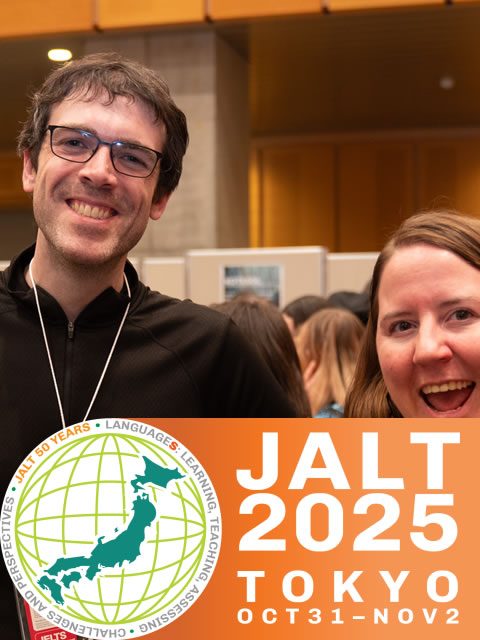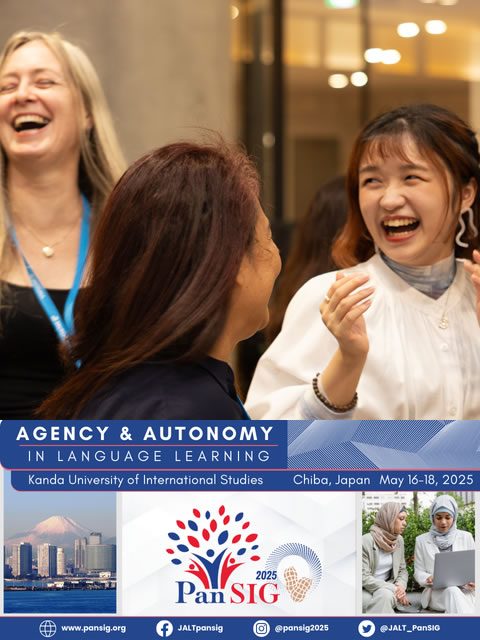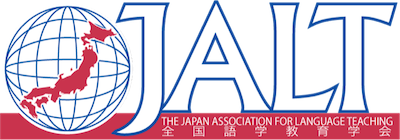Your cart is currently empty!
JALT2020 Plenary Speakers
•
We are pleased to announce that the following plenary speakers have been confirmed for JALT2020.
Yoshi Grote
Kay Irie
Patrick Jackson
Ahmar Mahboob
Rebecca Oxford
Yoshi Grote
Sponsored by JALT Tokyo Chapter
Plenary Session: Supporting Diversity in the Classroom Community
Sunday, Nov 22, 3:30 PM – 4:30 PM
Japan presents a unique cultural environment for LGBTQIA+ individuals; one not usually characterized by outward hostility, but by low visibility. As teachers working in multicultural environments, we are all necessarily interculturalists. We are also practiced at crafting our own cultures in our classrooms. These communities present an ideal space to empower and support LGBTQIA+ individuals, a place to demonstrate that, even if they are not ready to be seen, their identities are acknowledged and protected. This is possible no matter the subject matter or level of the class. Informed by years of course focus-group feedback and interviews with university-aged LGBTQIA+ students, this plenary address shares voices from some unseen students about classroom environments, practices and activities that have made them feel uncomfortable. The session doesn’t just outline what we shouldn’t do but also gives tangible advice about three areas:
1) How to effectively build open and trusting communities in the classroom.
2) Action points that can make an impact in any classroom.
3) Larger, explicit teaching moments to take if you have (or can make) the chance
Additional Session: Practical Steps to Empower Diverse Identities
Monday, Nov 23, 10:45 AM – 11:45 AM
Extensive research has already been done into the effectiveness of self-disclosure in the classroom environment, especially with regard to instructor self-disclosure. Cayanus & Martin (2004) and Hill, Ah Yun, & Lindsay (2008) identified the disclosure of personal information as one salient means of making an instructor seem approachable. They concluded such disclosure (as long as it is positive and seen as relevant) raises instructor credibility and encourages student participation. McBride & Wahl (2005) argue that teachers often share anecdotes from their personal lives with students in order to illustrate course content and establish credibility and other research (Cayanus & Martin, 2008; Cayanus, Martin, & Goodboy, 2009) has pointed to a correlation between instructor self-disclosure and students’ motivation and interest in course material.
This workshop takes this research and contextualizes it in the speaker’s own experience of coming out in the classroom. Following on from the plenary session, this workshop will interactively introduce ways to build trusting classroom communities and outline practical steps each teacher can take to empower diverse identities.
Yoshi Grote is a lecturer in intercultural skills and gender at Kyoto Sangyo University. Her research interests include the visibility and belonging of liminal identities with a special focus on third culture and LGBTQIA+ issues. In 2019, she organized the first Living on the Edge Conference in Kyoto. She has lived in twelve countries but is now somewhat “settled” in Northern Kyoto with her wife and 4-year-old daughter.
Kay Irie
Sponsored by JALT
Plenary Session: Language Learning as Positive Communication
Monday, Nov 23, 12:50 PM – 1:50 PM
In language education, it is appropriate and, perhaps, inevitable to view communication or interaction as the ends and means of language learning. We treat it as the opportunity for input and output, as well as language-use practice in various perspectives on second language acquisition. The purpose of language classes is often intended to prepare learners to engage in successful communication. When communication breaks down, we tend to attribute it to a lack of proficiency. Yet, there has been very little discussion of what else communication can bring to learners and users. In the field of communication studies, however, a positive psychology movement has inspired researchers to argue for a positive perspective on communication. Previously, as was the case in psychology, the focus of communication studies was on ‘solving problems.’ By contrast, the primary purpose of positive communication research is to discover how interaction can enhance our life by making it more pleasant, engaging, and meaningful. In other words, what are the benefits of interpersonal communication to people’s well-being? In this talk, I would like to explore some practical ideas from communication studies, using a leading model of positive communication, and consider its benefits to facilitate the development of healthy communities of language learners and teachers.
Additional Session: Introductory Workshop on Q-methodology
Saturday, Nov 21, 2:00 PM – 3:00 PM
Q-methodology is an underused research method to identify subjective views within a community about a particular topic. It includes both elements of quantitative and qualitative techniques to investigate people’s opinions without breaking them into a limited number of variables. While it has been used widely in various fields of social science, the application in language education research is still limited. In this workshop, I will give an overview of the method, take the audience through the basic steps, and consider how we can use it in our classes and our research. The uniqueness of Q methodology lies in its emphasis on subjectivity and the whole-person approach through its design which consists of three major steps. The first step is to create a set of ideas related to the topic so that participants feel that they can fully express their views. By using Q sort, each participant compares and rates the ideas. Collectively, the rating of the statements becomes the representation of their personal opinions. The next is the statistical analytical procedure, by-person factor analysis, to extract factors based on the correlations between persons rather than between statements. The factors represent the similarity of people’s views. The final step is the iterative process of interpreting the factors looking at the entire set of statements, not only the ones with high or low ratings. The workshop will include hands-on experiences and information on the various software applications for data collection and analysis.
Kay Irie is a Professor at the Faculty of International Social Sciences, Gakushuin University, Tokyo. She is involved in developing and managing the English language program to support EMI. She also teaches at the Graduate College of Education at Temple University Japan. Her research interests include language learning psychology, learner autonomy, and research methods in these areas, including Q-methodology.
Patrick Jackson
Sponsored by Oxford University Press and JALT Teaching Young Learners SIG
Plenary Session: My Twenty-Five Year Lunch
Saturday, Nov 21, 3:30 PM — 4:30 PM
In 1995, I wandered into a Japanese restaurant in Dublin, ordered a bowl of noodles and fell in love. I woke up on the other side of the world doing my best to teach very small children how to speak a bit like me. This led on to teaching positions at junior high, high school, and universities in Nagoya. In this talk, I’ll be looking at a quarter of a century of highs and lows in the world of language, content and culture. I will be sharing learnings and incidents from parallel careers as a teacher, author, publisher, and study abroad coordinator that point to ways in which Japanese students might be served better. I will also share some events and incidents that might help others avoid my worst mistakes. These include broken bones, beach finds, and advice on how best to ride the bullet train in a potato suit.
Additional Session: Activities and Activism for the Anthropocene
Sunday, Nov 22, 4:45 PM — 5:45 PM
Teachers and children are bombarded with environmental bad news leading to anxiety and a feeling of powerlessness. What can we do to help young learners during an age of crises? Real world action is the most effective way of addressing these anxieties and the core issues behind them. Classroom learning can only go so far so connections need to be made beyond the classroom. Participants in this workshop will explore ways of linking the classroom to the wider world in real and meaningful ways and look at activities that make the world a better place. Patrick will be drawing on his own experience as Director of the Picker Pals environmental program for primary school children, their families, and the communities they live in.
Patrick Jackson is an ELT author interested in the use of songs, stories and real world connections to motivate learners. Now back in Ireland after twelve years teaching Japanese learners of all ages, Patrick is motivated by the power of real-world experiences and community action to inspire and give meaning to classroom learning. A passionate beachcomber and litter-picker, he is currently working on projects that help children discover their role as environmental stewards. He is the author of several courses published by Oxford University Press including Everybody Up and Potato Pals. He occasionally wears a cloak festooned with marine debris. Patrick tweets as @patjack67.
Ahmar Mahboob
Sponsored by JALT
Plenary Session: The CREDIBLE Approach in the Classroom
Sunday, Nov 22, 8:15 AM – 9:15 AM
The CREDIBLE approach encourages students and teachers to create projects that address real needs of people and communities where they live. The CREDIBLE approach, which takes a transdisciplinary and translingual approach in developing classroom practices and goals, is an attempt to reharmonise our understandings of language and knowledge in our local settings.
CREDIBLE is an acronym used to highlight the relationship between our educational work
and our social and environmental contexts:
Contextually Relevant
Responds to practical needs
Engages stakeholders
Draws on an understanding of local knowledge and practices
Informed by diverse approaches and experiences
Benefits local communities
Leads the field/discipline and contributes to the larger (global) theories
Ethical
In this session, we will unpack the notion of CREDIBLE and then look at examples of projects that classroom practitioners have carried out in diverse contexts. We will also consider possible projects that you can develop in your own contexts.
Additional Session: Doing Broad Positive Discourse Analysis
Friday, Nov 20, 12:00 PM – 1:00 PM
Positive discourse analysis (PDA) is an approach where we look at successful projects and things in order to understand what makes them work. PDA can be done in different ways, e.g. a narrow PDA can focus on the language resources used to make a text work. A broad PDA, on the other hand, looks at how projects draw on all our semiotics resources to achieve their goals.
In this workshop, I will share some tools that we can use to carry out broad PDA analysis along with examples of how people use these tools in real world settings. We will then consider how broad PDA can be used to develop and carry out CREDIBLE projects (which I will discuss in detail during my plenary). In doing so, we will learn how we can use PDA for both analysis of projects as well as creating our own projects with the aim of harmonising our communities and eco-systems.
Ahmar Mahboob (Prof Nomad) is Associate Professor of Linguistics at the University of Sydney. Prof Nomad’s current work focusses on how humans make sense and engage with the world through the use of all their socio-semiotics, which includes (but is not limited to) language. His goal in doing this is to develop alternative approaches to doing social-sciences – ones that are more integrated and respond to real human, non-human, and environmental needs.
Rebecca Oxford
Sponsored by JALT
Plenary Session: Natural Harmony: Teaching Language, Teaching Peace
Saturday, Nov 21, 9:30 AM – 10:30 AM
Peace is not the absence of conflict; instead, peace is harmony attained by working productively with conflicting perspectives (based on Martin Luther King, Jr.). In this lively plenary, Rebecca Oxford focuses on the natural harmony between teaching language and teaching peace. Teaching language and teaching peace have much in common. A shared goal of language instruction and some forms of peace instruction is to help people learn to communicate effectively with words (verbally) and without words (nonverbally, through facial expression, gaze, posture, space, touch, and vocal cues) to increase understanding and cooperation.
Language teachers empower learners to develop such communicative competence in a second or foreign language, while many professional mentors in peacebuilding foster improved verbal and nonverbal communication in individuals’ first language for use in conflict resolution and conflict transformation. Effective communication through language instruction or peace instruction leads to working more harmoniously to deal with differences and conflicts across individuals, groups, and cultures.
Rebecca and colleagues Tammy Gregersen, Matilde Olivero, and Melinda Harrison are developing ways to teach language and peacebuilding simultaneously on educational campuses, on Zoom, or in hybrid modes so that language teachers and learners can become intentional peacebuilders. Peace is an active, daily process that demands imagination, love, and effort (Boulding, 2000). Rebecca takes us to the heart of peacebuilding in language education by introducing her Language of Peace Approach, explaining how it is used in language teaching and teacher education, and describing several activities that combine teaching language and teaching peace.
Additional Session (with María Matilde Olivero): Exciting, Practical Language Activities for Peacebuilding
Sunday, Nov 22, 9:30 AM – 10:30 AM
Rebecca and Matilde invite language educators (language teachers and teacher educators) to recognize themselves and their students as potential peacebuilders. Language educators already use peacebuilding strategies when they teach students to understand cultures, communicate in another language, or deal harmoniously with conflict or stress. In addition, language educators can intentionally incorporate short, dynamic peacebuilding activities into their classes (onsite, online, or hybrid). Using a role-play involving a cultural conflict, the workshop leaders show how a single activity gives simultaneous practice in English and in intercultural peacebuilding. Next, they demonstrate how a great song, “Stand by Me,” evokes images and emotions and how it stimulates discussion of a key peace theme, friendship. These activities lead to other activities involving combinations of the four language skills. Matilde and Rebecca explain how students can create original, peace-related poetry, stories, reports, songs, and art for a talent show, print publication, or website. The activities are flexible enough to fit existing curricula, student proficiency levels, and online, hybrid, and in-person modes. Peace-language activities in the workshop are based on Oxford’s Language of Peace Approach (inner, interpersonal, intergroup, intercultural, international, and ecological peace), positive psychology, and social and emotional learning (SEL). Another conceptual inspiration for these activities is the movement for “21st Century Skills,” condensed to “6 C’s”: communication, collaboration, creativity, cultural understanding, critical thinking, and commitment. Rebecca and Matilde provide a digital link to 30 EFL/ESL peacebuilding activities, a list of relevant publications and website addresses, and contacts for possible collaboration.
Rebecca L. Oxford , Ph.D. (Professor Emerita and Distinguished Scholar-Teacher, University of Maryland) co-edited Peacebuilding in Language Education (Multilingual Matters, 2021). She has published 14 other books on peace, eco-education, transformative education, and language learning and has given presentations in 43 countries. She co-edits two book series: Spirituality, Religion, and Education (Palgrave) and Transforming Education for the Future (Information Age). “Rebecca Oxford’s research has changed the way the world teaches languages,” stated a lifetime achievement award.
María Matilde Olivero, Ph.D., second language teacher-educator and researcher at Universidad Nacional de Río Cuarto, Argentina, investigates (a) peacebuilding approaches in language education and language teacher education and (b) affective factors in second language teaching and learning. Matilde co-edited Peacebuilding in Language Education:Innovations in Theory and Practice for Multilingual Matters (2021). She has published peer-reviewed articles and book chapters and presented at internationally renowned conferences for language educators, language teacher educators, and peace educators.

JALT2025 International Conference
2025年10月31日(金)〜2025年11月02日(日) 東京都渋谷 国立オリンピック記念青少年総合センター Friday, October 31 – Sunday, November 02, 2025 • National Olympics Youth Memorial Center, Tokyo, Japan

PanSIG Conference
PanSIG 2025 will be held May 16-18 in Chiba. PanSIG is an annual conference organized by JALT’s Special Interest Groups (SIGs).
